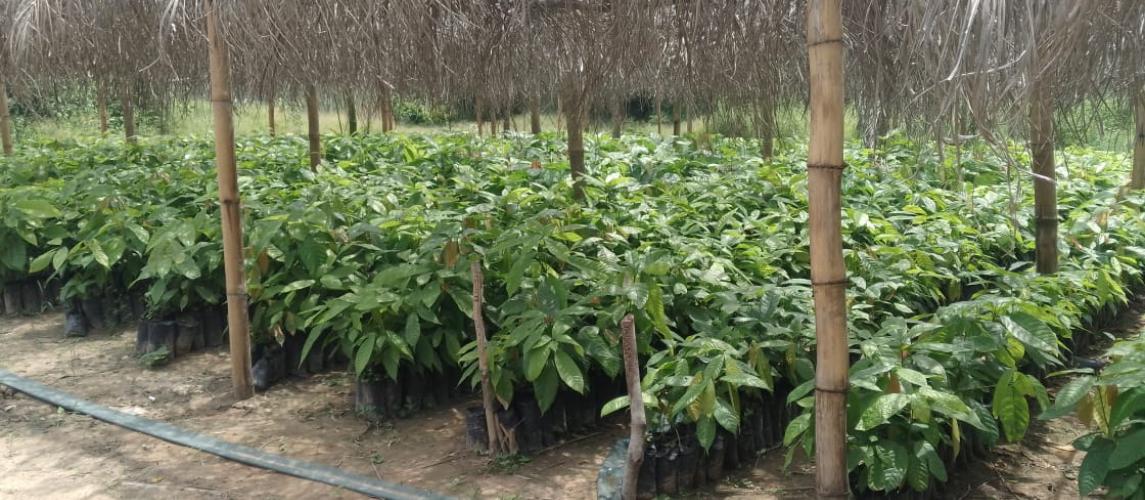
CARI Researchers Drive Innovation in Cocoa Farming to Preserve Liberia’s Traditional Quality
BEEPLAY, Nimba County – For years, Liberian farmers have struggled with uncertified, low-yield cocoa seeds due to the absence of a nationally regulated cocoa seed garden. This challenge has led to poor-quality production, inconsistent harvests, and reduced market competitiveness. Additionally, without access to disease-resistant varieties, cocoa farms remain vulnerable to pests, threatening the rural economy and diminishing supply.
To address these issues, the Government of Liberia, in partnership with the International Fund for Agricultural Development (IFAD), signed a Memorandum of Understanding (MoU) on September 30, 2019, establishing the National Cocoa Seed Garden (NCSG) in Beeplay, Nimba County. Spanning 75.81 acres, with 18 hectares already cultivated, this initiative aims to improve access to high-quality planting materials, bolster cocoa production, and increase farmers’ yields.
The NCSG is implemented by the Central Agricultural Research Institute (CARI) under the Tree Crops Extension Project (TCEP). Its primary goals include supplying farmers with certified, high-yield cocoa varieties, promoting sustainable farming techniques, and driving innovation across Liberia’s cocoa industry.
The initiative utilizes existing clonal and germplasm garden materials introduced by the International Institute for Tropical Agriculture (IITA), Reading University, and the Cocoa Research Institute of Ghana between 2008 and 2017, housed at CARI’s budwood garden. To confirm parental lines and genetic integrity, advanced SNP/DNA analysis techniques are employed at the garden.
A team of experts, including an international consultant specializing in cocoa seed garden development and the lead of the seed garden development in person of Charles F. King, a research officer from CARI, supports the project. Additionally, in 2019, a soil analysis was conducted at the Beeplay site by CARI’s Natural Resource Program.
During a visit to Beeplay on May 15, 2025, Charles King, lead of the project, underscored the importance of climate-smart cocoa seedlings. "This approach enhances sustainability, ensuring farmers can maintain stable production despite climate variability," King stated.
One of the major benefits of the National Cocoa Seed Garden is the production and distribution of high-yielding cocoa seedlings, improved crop resilience, and greater market competitiveness. Looking ahead, King outlined key activities for 2025–2027, including: completion of the garden planting and expansion; regional hybrid testing at national and sub-station levels, and training agricultural officers on agroforestry, cocoa cultivation, and best farming practices, as well as public-private partnerships for seed distribution and supply enhancement.
By 2027, the seed garden’s output (seed) is expected to plant 3,500 to 5,000 cocoa landscapes annually, provided all operational factors remain constant. To support this expansion, additional boreholes and infrastructure developments are planned, alongside intensified agroforestry practices as mitigation strategies in the face of climate change.
King further detailed the planting initiatives, noting that four female pod-bearing clones with strong genetic diversity, yield potential, and slight disease resistance were planted across 15 hectares, and ten male clone varieties were established on three hectares to enhance breeding efficiency.
However, King expressed concerns about sustaining the project beyond donor support, stating, “Operating the seed garden without continued financial assistance would severely impact CARI’s ability to maintain and scale the initiative.”
CARI agronomist Saah E. Gbollie emphasized that, beyond seed distribution, the NCSG functions as a research hub, enabling scientists to study new cocoa seed varieties while refining local cultivation techniques. "Farmers gain invaluable training, ensuring skill-building and knowledge transfer within communities," Gbollie explained.
Research assistant and agronomist Nelson Kollie, also assigned to the project, highlighted the economic impact of high-quality cocoa seedlings. "Better planting materials lead to increased crop yields, allowing farmers to boost their earnings and lift rural communities out of poverty," he stated.
Through modernized planting techniques, reduced reliance on uncertified seeds, and expanded export opportunities, the National Cocoa Seed Garden is set to transform Liberia’s cocoa industry. "This initiative strengthens Liberia’s position in global cocoa markets while ensuring the sustainability of our local production," Kollie added.
After a two-day guided tour, Mrs. Abibatu Toure Kromah, speaking on behalf of Dr. Arthur Bob Karnuah, Director General of CARI, commended the seed garden team for their efforts in establishing Liberia’s first National Cocoa Seed Garden.
Mrs. Kromah, Extension Specialist and former head of CARI’s Post-Harvest and Food Processing Program, urged policymakers and partners, both national and international, to extend support beyond 2026, when IFAD’s funding is scheduled to end.
She dismissed claims that CARI cannot operate the seed garden independently and instead called for government backing. "We are collaborating with the legislative caucuses of Bong and Nimba counties to secure budgetary support, ensuring the continued operation of the Beeplay seed garden," she asserted.
The National Cocoa Seed Garden is a groundbreaking initiative aimed at preserving Liberia’s traditional cocoa quality through scientific innovation, improved yields, and sustainable farming practices. By providing superior planting materials, CARI researchers are ensuring Liberia remains competitive on the international stage while securing a resilient agricultural future for local farmers.
